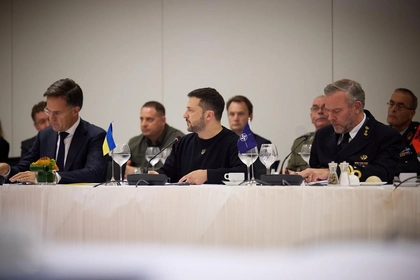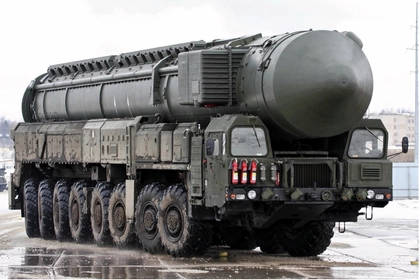- What did Ukrainian President Zelensky just say about nuclear weapons?
Ukraine President Volodymyr Zelensky, on Thursday, speaking in Ukrainian, told a Brussels press conference that Ukraine, in 1994, gave up its nuclear weapons in exchange for assurances from Russia, the US, China, France and Britain that Ukraine’s borders would be respected and no nuclear state would invade Ukraine.
A key condition in the deal, from the side of the countries keeping nuclear weapons, was that they would never use a nuke against now non-nuclear Ukraine, or against Belarus and Kazakhstan, who signed similar agreements at the same time.
JOIN US ON TELEGRAM
Follow our coverage of the war on the @Kyivpost_official.
Ukraine now has no choice but to join NATO, since the deal – the Budapest Memorandum – agreed to by Ukraine, a non-nuclear state, obviously isn’t working, he said.
Zelensky went on to point out the obvious, that NATO states are at peace and under a nuclear umbrella, and Ukraine has no nuclear umbrella and is at war.
The subtext was lost on few: If Ukraine isn’t allowed into NATO, and Russian military aggression isn’t stopped, then Ukraine’s promise in that agreement not to be a nuclear state, and to reject the development and use of nuclear weapons, is inherently nullified.
At a NATO summit later in the day, Zelensky, speaking in workable English, explained to reporters that Ukraine wasn’t suggesting it wants nuclear weapons or is developing them, and suggested reports Ukraine might be were misleading.

Israel Offers Seized Russian Weapons From Hezbollah Raids to Ukraine
“We never spoke about that we are preparing to create nuclear weapons or something like this. I said that when the Budapest Memorandum was signed by very honorable, very powerful nuclear countries, there was written ‘that Ukraine gives nuclear weapon, and that Ukraine will have from these very respectable countries, including those time Russia, China, United States, including them. Yes? That we will have our secure territorial integrity. And sovereignty. But we don’t do nuclear weapons. Please, don’t move (push) this message (that Ukraine intends to develop a nuclear weapon).”
- Wait a minute. I thought Ukraine was poor. CAN Ukraine even develop nukes and delivery systems?
The short answer is yes, it’s certainly possible.
When the Soviet Union imploded in 1989 and Ukraine became its own country, it inherited about one-fifth of the Soviet Union’s intercontinental ballistic missile force. At the same time, it operated a nuclear power station – the infamous Chernobyl plant – with three functional reactors designed to produce plutonium suitable for enrichment into weapons-grade fissionable materials.
The last of those reactors stayed online until 2006, meaning that one key component of the supply chain needed for the creation of one or several nuclear devices – large quantities of a fissionable material suitable for enrichment was (and possibly is) already on hand in Ukraine
According to Ukraine’s government and International Atomic Energy Agency (IAEA) those materials were removed from Ukraine aside from a small quantity maintained in the country for research.
Ukraine’s main research institute is the Kharkiv Institute for Physics and Technology. IAEA inspectors visit that site regularly, most recently in July 2024.
In wartime Ukraine, the possibility of nuclear research and development work being performed, or storage of plutonium in quantity suitable for enrichment, beyond IAEA overview, cannot be excluded. Likewise, total US/NATO knowledge of all Ukrainian government activities is unlikely.
That there is a knowledge base for the development of a weapon, because of its longstanding nuclear experience both with weaponry and nuclear materials, in Ukraine, seems to be widely accepted.
Ukraine’s innovative and increasingly capable drone bombardment of targets sometimes 1,500 kilometers inside Russia, at least theoretically, answers the question of the delivery system. Explosives-toting Ukrainian aircraft carrying payloads heavier than, a theoretical small nuclear device, developed by Ukrainian scientists, have hit targets inside Russia repeatedly.
The key questions facing a clandestine Ukrainian nuclear weapons program, assuming fissionable materials were in hand, probably would be how to enrich those materials to weapons-grade, and how to keep it a secret.
Countries with resources and a technical base similar to Ukraine’s and sometimes inferior – India, Israel, Pakistan, North Korea and probably also South Africa – all have developed and detonated a nuclear device.
- So how close are we to a Ukrainian nuke?
The official answer we already have from Zelensky: Ukraine isn’t even trying.
If he is not telling the truth, then the program would probably be Ukraine’s most closely guarded military secret.
Germany’s Bild magazine, on Thursday, quoted an unnamed Ukrainian official saying the capacity, knowledge, and material resources are there and that it would simply be a matter of Kyiv deciding to build a functional device – the components and the skill already in hand. “We have the material, we have the knowledge. If the order is given, we will only need a few weeks to have the first bomb…The West should think less about Russia’s red lines and more about our (Ukrainian) red lines,” the Bild article quoted an official with reportedly good knowledge of Ukraine’s nuclear weapons development capacity as saying.
Two Ukrainian security community sources in contact with Kyiv Post since the outset of the war, and contacted separately for comment on the Bild report, said that Ukrainian ability to build a nuclear device quickly is widely accepted in their agencies. Neither works in weapons development and each said they had not seen any clear evidence of the capacity.
Both said the general understanding in their agencies is consistent with the Bild report, that Ukraine could, if it wished, put together a nuclear device “in a matter of weeks.”
Mikhail Khodarenok, a retired Russian army colonel and frequent pro-Kremlin commentator, in a Thursday Gazeta.ru article, said Ukraine is incapable of developing a nuclear weapon because the country lacks materials, technical know-how, and responsible national leadership.
- So what’s the official Russian reaction? They say they invaded Ukraine to keep Ukraine out of NATO and to prevent the deployment of nuclear weapons on Russia’s border. Aren’t they furious?
Actually, the official Russian reaction to what Zelensky said in Brussels about nuclear weapons and NATO has been pretty muted so far.
Kremlin spokesman Dmitry Peskov, in just about the only official comment on Zelensky’s Brussels remarks, said it was probably all a “camouflaged” US plan to destroy Russia by fighting “until the last Ukrainian.”
The Putin spokesman even suggested Zelensky might have been floating an “impossible” proposition (Ukraine joining NATO) in public, to create space for concessions he must make to Russia later.
“But there could be a different plan there, which could be really peaceful, which is for the Kyiv regime to realize the futility of the policies they are pursuing and to realize the need to sober up and realize the causes that led to this conflict,” Peskov said.
Unofficially, on state-controlled Russian television, where messaging is aimed primarily at the Russian general public, the reaction has been to paint Russia as a victim that should do more to defend itself.
Kremlin chief propagandist, Vladimir Solov’yev, during a Thursday evening “news” program on the national channel Rosssiya 1 did not mention Zelensky’s Brussels visit directly, but in a diatribe told viewers that Russia’s best strategy would be to unleash tactical nuclear devices on Ukraine immediately, even if Russia may have promised never to do that.
“Doomsday weapons are one thing. Those are strategic weapons. But why did we create tactical weapons? If people start shouting ‘How dare you?’, then I say, ‘Why not? On what grounds? We are being attacked! It’s happening!,” Solov’yev said.
“This needs to be clearly understood. The wording [in the Budapest Memorandum] about never using nuclear weapons against non-nuclear states, Good God, there are only 140 million of us. If we are attacked by a [NATO-led] armed horde of 500 million, armed with sometimes better weapons, we are supposed to say ‘No, nuclear weapons shouldn’t be used?” he said.
- What about the Ukrainians? Are they getting ready for World War III?
Judging by the direction of Ukrainian news reporting the day after Zelensky implied Ukraine might have to develop a nuclear weapon and even detonate it to stop Russia, the Ukrainians seemed to have other priorities.
Probably the biggest news on Friday morning was that Russia had launched one of its biggest drone attacks in months, sending some 140-150 explosives-toting kamikaze aircraft into Ukrainian air space overnight.
The air battles were fought across the country in engagements sometimes lasting hours.
The night’s score card, according to the Ukraine Air Force was fairly upbeat, counting 80 attack drones shot down, 40 jammed and mostly diverted from course, two to four apparently flying onward into Belarus by accident, and about 10 still in the air by morning rush hour. Traffic was moving normally and there were no reports of major damage.
The major news agency UNIAN led the day’s news cycle with Defense Minister Rustem Umerov commenting on reports Ukraine might have to give up territory to Russia in order to join NATO (he said he hadn’t heard any), US President Biden telling a Berlin press conference Ukraine needs more support, and South Korea-sourced intelligence reporting that thousands of North Koreans might wind up fighting in Ukraine.
Other top stories included: Budapest Prime Minister Orban’s rubbishing of Zelensky’s peace plan (without using the word “nuclear”), German Chancellor Scholtz’s denial his government is drawing out the Russo-Ukrainian War because of escalation-phobia, an overloaded Russian cargo ship that sunk by Sakhalin Island, and big volcanic eruptions in Japan and Mexico.
Excepting slower information platforms that were only just getting around to Zelensky’s Thursday Brussels remarks on Friday morning, what he said about nuclear weapons was yesterday’s news.
You can also highlight the text and press Ctrl + Enter










